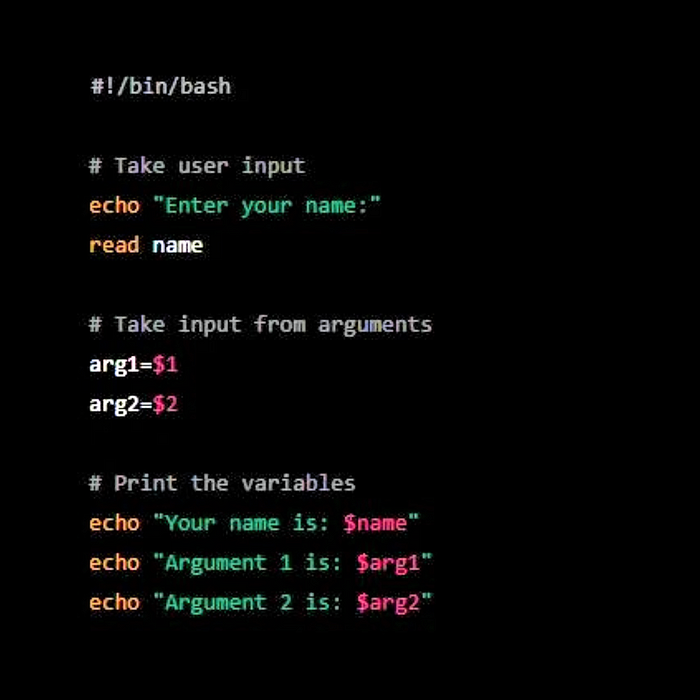Hello everyone I am back with a new DevOps task.

01. Explain in your own words and examples, what is Shell Scripting for DevOps?
Shell scripting is a programming language that is used for automating tasks and system administration in a Linux or Unix environment. In the context of DevOps, shell scripting plays a crucial role in automating repetitive tasks and streamlining the deployment and management of applications.
With shell scripting, DevOps engineers can write scripts to automate tasks such as installing software packages, configuring systems, setting up network connections, and managing files and directories. This reduces the manual effort required to perform these tasks, which in turn saves time and improves efficiency.
For example, suppose a DevOps engineer wants to automate the process of deploying an application to a server. With shell scripting, they can write a script that automates the entire process, including downloading the application code, setting up the necessary dependencies, configuring the server, and starting the application. This script can then be executed automatically or with a simple command, reducing the time and effort required for deployment.
Furthermore, shell scripting allows DevOps engineers to create custom scripts that can be integrated with other DevOps tools such as CI/CD pipelines, monitoring and alerting systems, and configuration management tools. This integration enables the automation of end-to-end processes, from code development to deployment and monitoring.
Overall, shell scripting is an essential skill for DevOps engineers as it enables the automation of complex and repetitive tasks, leading to increased efficiency and productivity in DevOps practices.
02. What is #!/bin/bash? can we write #!/bin/sh as well?
The line “#!/bin/bash” is known as the shebang or hashbang. It is a special character sequence that tells the system which interpreter to use for executing the script.
In this case, “/bin/bash” specifies the Bash shell as the interpreter. Bash is a popular shell on Linux and Unix systems and is commonly used for scripting.
Yes, it is also possible to use “#!/bin/sh” in the shebang line. “/bin/sh” specifies the Bourne shell as the interpreter. The Bourne shell is an older shell that is less feature-rich than Bash, but it is still commonly available on many systems and can be used for simple scripting tasks.
However, it is worth noting that Bash is backward compatible with Bourne shell syntax, so many scripts written for Bourne shell will work in Bash without modification. Therefore, unless there is a specific reason to use the Bourne shell, it is generally recommended to use Bash for shell scripting.
03. Write a Shell Script which prints I will complete #90DaysOofDevOps challenge.
Here’s an example of a simple shell script that will print the message “I will complete #90DaysOfDevOps challenge” to the console:
#!/bin/bash
echo "I will complete #90DaysOfDevOps challenge"
This script uses the “echo” command to output the message to the console. The shebang line at the top of the script specifies that Bash should be used as the interpreter.
To run this script, you can save it to a file with a “.sh” extension (e.g. “myscript.sh”), make it executable with the command “chmod +x myscript.sh”, and then execute it with “./myscript.sh” or by specifying the full path to the script.
04. Write a Shell Script to take user input from arguments and print the variables?
Here’s an example of a shell script that takes user input, input from arguments, and prints the variables:
#!/bin/bash
# Take user input
echo "Enter your name:"
read name
# Take input from arguments
arg1=$1
arg2=$2
# Print the variables
echo "Your name is: $name"
echo "Argument 1 is: $arg1"
echo "Argument 2 is: $arg2"
This script prompts the user to enter their name, reads the input into the variable “name”, and then assigns the first two command-line arguments to the variables “arg1” and “arg2”. It then uses the “echo” command to print the values of these variables to the console, along with some descriptive text.
To run this script, you can save it to a file with a “.sh” extension (e.g. “myscript.sh”), make it executable with the command “chmod +x myscript.sh”, and then execute it with “./myscript.sh arg1 arg2”, where “arg1” and “arg2” are the command-line arguments you want to pass to the script. You will also be prompted to enter your name during execution.
05. Write an Example of If else in Shell Scripting by comparing 2 numbers.
Here’s an example of using if-else statements in shell scripting to compare two numbers:
#!/bin/bash
# Assign two numbers to variables
num1=5
num2=10
# Compare the numbers using if-else statements
if [ $num1 -gt $num2 ]
then
echo "$num1 is greater than $num2"
elif [ $num1 -lt $num2 ]
then
echo "$num1 is less than $num2"
else
echo "$num1 is equal to $num2"
fi
In this example, we assign the values 5 and 10 to the variables “num1” and “num2”, respectively. We then use if-else statements to compare these two numbers.
First, we check if num1 is greater than num2 using the condition [ $num1 -gt $num2 ]. If this condition is true, we print the message “$num1 is greater than $num2”.
If the first condition is false, we move on to the next condition using elif [ $num1 -lt $num2 ]. If this condition is true, we print the message “$num1 is less than $num2”.
If both of these conditions are false, we move on to the final else statement, which is executed when num1 is equal to num2. In this case, we print the message “$num1 is equal to $num2”.
To execute this script, you can save it to a file with a “.sh” extension (e.g. “my_script.sh”), make it executable with the command “chmod +x my_script.sh”, and then run it using “./my_script.sh”. The output will be the message “$num1 is less than $num2”, since 5 is less than 10.


